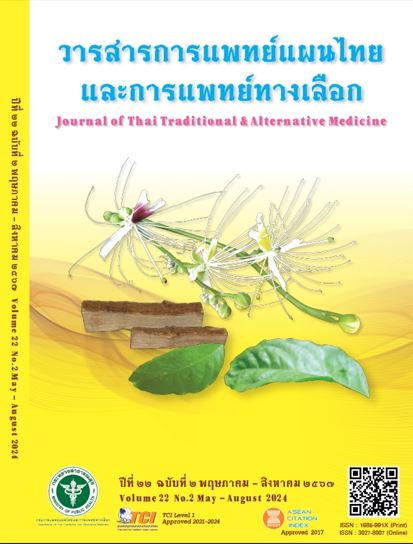Stimulatory Effect of Thai Herbal Plant Extracts on Lymphocytes for Destruction of Cultured Chronic Myeloid
Main Article Content
Abstract
Introduction and Objective: This research aims to screen and evaluate the effects of Thai herbal extracts in stimulating white blood cells, specifically lymphocytes, to destroy cultured leukemia cells at the in vitro level.
Methods: Herbal extracts were utilized to stimulate peripheral blood mononuclear cells (PBMCs) in the laboratory for 24 hours. Subsequently, the PBMCs were cultured with K-562 CCL-243™ chronic myelogenous leukemia cell line labeled with the fluorescent dye Carboxyfluorescein succinimidyl ester (CFSE) for 4–6 hours. The K-562 CCL-243™ cell line was then stained with Propidium iodide (PI) to identify dead cells, and analyzed using a flow cytometer. The destroyed K-562 CCL-243™ cell line was stained with PI and CFSE, while the viable cells remained stained only with CFSE.
Results: Testing the activity of 17 herbal plant extracts on PBMCs from donated blood (3 donors) revealed that 5 herbal extracts could significantly stimulate PBMCs to destroy K-562 CCL-243™ cell line compared to unstimulated control PBMCs. The effective herbal extracts include HID (Helicteres isora L. aqueous extract), CSS (Cannabis sativa L.), CCF (fresh cinchona, Cinchona ledgeriana Moens.), CCD (dried cinchona), and AED. 1 (Pilangkasa, Ardisia elliptica Thunb.).
Discussion: While this study tested PBMCs stimulation in three healthy volunteers and conducted statistical analyses, future research should consider increasing the number of volunteers and including blood samples from leukemia patients to enhance the confidence of the test results.
Conclusion and Recommendation: The laboratory test results indicate the scientific properties of Thai herbal extracts, demonstrating their ability to stimulate PBMCs and destroy K-562 CCL-243™ cultured cancer cells at the in vitro level. Therefore, further research should focus on identifying the active ingredients and mechanisms of these herbal extracts to confirm their efficacy in destroying cancer cells. This could contribute to the development of Thai medicine, promoting the utilization of Thai medicinal plants for leukemia treatment.
Article Details

This work is licensed under a Creative Commons Attribution-NonCommercial-NoDerivatives 4.0 International License.
References
Hospital. BI. Leukemia. Bumrungrad International Hospital [Internet]. Bumrungrad International Hospital.; [cited 2024 Jan 2]. Available from: https://www.bumrungrad.com/th/conditions/leukemia. (in Thai)
Abrams S, Brahmi Z, editors. Mechanism of K-562 CCL-243™ -induced human natural killer cell inactivation using highly enriched effector cells isolated via a new single-step sheep erythrocyte rosette assay. Annales de l'Institut Pasteur/Immunologie; 1988: Elsevier.
Abrams S, Brahmi Z. Target cell directed NK inactivation. Concomitant loss of NK and antibody-dependent cellular cytotoxicity activities. Journal of immunology (Baltimore, Md: 1950). 1988;140(6):2090-5.
Suparak S. Screening for Determination of Immunomodulatory Activities of MedicinalPlants Using Lymphocyte Proliferation Assay. In: Chokevivat V, editor. Journal of Thai Traditional & Alternative Medicine2023;21(1). p. 119-30. (in Thai)
Cervantes J. Indoor marijuana horticulture: Van Patten Publishing; 2002.
Guy GW, Whittle BA, Robson P. The medicinal uses of cannabis and cannabinoids: Pharmaceutical Press London, UK:; 2004.
Stasiłowicz A, Tomala A, Podolak I, Cielecka-Piontek J. Cannabis sativa L. as a natural drug meeting the criteria of a multitarget approach to treatment. International journal of molecular sciences. 2021;22(2):778.
Chang Y, Zheng C, Chinnathambi A, Alahmadi TA, Alharbi SA. Cytotoxicity, anti-acute leukemia, and antioxidant properties of gold nanoparticles green-synthesized using Cannabis sativa L leaf aqueous extract. Arabian Journal of Chemistry. 2021;14(4):103060.
Anceschi L, Codeluppi A, Brighenti V, Tassinari R, Taglioli V, Marchetti L, et al. Chemical characterization of non‐psychoactive Cannabis sativa L. extracts, in vitro antiproliferative activity and induction of apoptosis in chronic myelogenous leukaemia cancer cells. Phytotherapy Research. 2022;36(2):914-27.
Lal S, Shekher A, Narula AS, Abrahamse H, Gupta SC. Cannabis and its constituents for cancer: History, biogenesis, chemistry and pharmacological activities. Pharmacological Research. 2021;163:105302.
Peeri H, Koltai H. Cannabis biomolecule effects on cancer cells and cancer stem cells: Cytotoxic, anti-proliferative, and anti-migratory activities. Biomolecules. 2022;12(4):491.
Jemma. Cinchona and Treating Malaria. Herbology Manchester [Internet].2015 [cited 2024 Jan 2]. Available from: https://herbologymanchester.wordpress.com/2015/05/27/cinchona-and-treating-malaria/.
Hariyanti H, Mauludin R, Sumirtapura YC, Kurniati NF. A Review: Pharmacological Activities of Quinoline Alkaloid of Cinchona sp. 2022.
Zuccato C, Cosenza LC, Zurlo M, Lampronti I, Borgatti M, Scapoli C, et al. Treatment of erythroid precursor cells from β-thalassemia patients with cinchona alkaloids: induction of fetal hemoglobin production. International Journal of Molecular Sciences. 2021;22(24):13433.
Cheng G-G, Cai X-H, Zhang B-H, Li Y, Gu J, Bao M-F, et al. Cinchona alkaloids from Cinchona succirubra and Cinchona ledgeriana. Planta medica. 2014;80(02/03):223-30.
Lim TK. Edible medicinal and non-medicinal plants: Springer; 2012.
Alias NZ, Kamisah N, Ishak M, editors. Chemical Constituents and Bioactivity Studies of Ardisia elliptica. The Open Conference Proceedings Journal; 2014.
Moongkarndi P, Kosem N, Luanratana O, Jongsomboonkusol S, Pongpan N. Antiproliferative activity of Thai medicinal plant extracts on human breast adenocarcinoma cell line. Fitoterapia. 2004;75(3):375-7.
Dey SK, Hira A, Howlader MSI, Ahmed A, Hossain H, Jahan IA. Antioxidant and antidiarrheal activities of ethanol extract of Ardisia elliptica fruits. Pharmaceutical biology. 2014;52(2):213-20.
Al-Abd NM, Nor ZM, Mansor M, Zajmi A, Hasan MS, Azhar F, et al. Phytochemical constituents, antioxidant and antibacterial activities of methanolic extract of Ardisia elliptica. Asian Pacific journal of tropical biomedicine. 2017;7(6):569-76.
Newell AM, Yousef GG, Lila MA, Ramírez-Mares MV, de Mejia EG. Comparative in vitro bioactivities of tea extracts from six species of Ardisia and their effect on growth inhibition of HepG2 cells. Journal of ethnopharmacology. 2010;130(3):536-44.
Ondee S, Sithisarn P, Mangmool S, Rojsanga P. Chemical standardization and anti-proliferative activity of Ardisia elliptica fruit against the HCT116 human colon cancer cell line. Molecules. 2020;25(5):1023.


